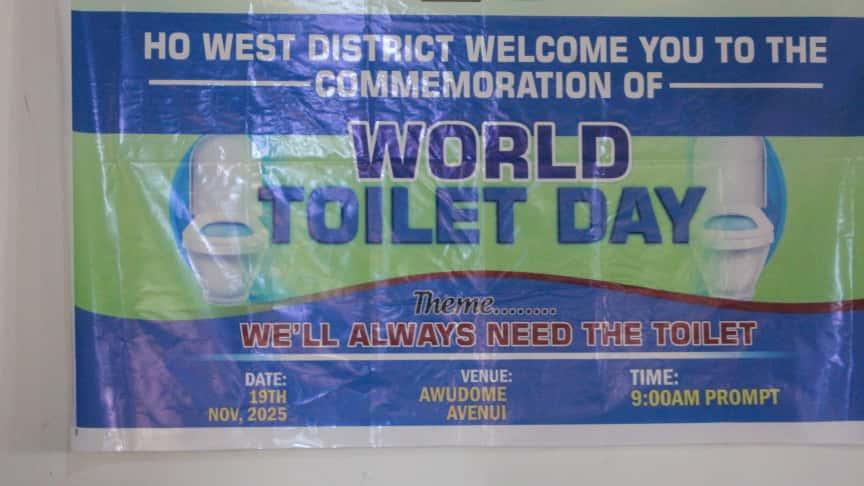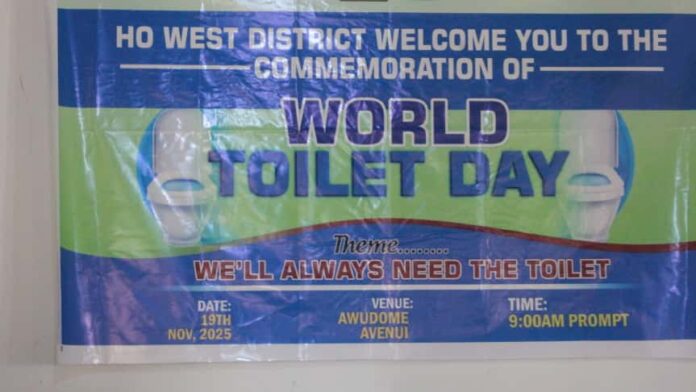The Volta Regional Environmental Health Directorate has joined the global community to commemorate World Toilet Day 2025, calling for renewed commitment to ending open defecation and improving access to safe sanitation across all communities.
This year’s celebration, held under the theme “We Always Need a Toilet”, brought together local government officials, traditional leaders, environmental health officers, students, and civil society groups in Ho West and South Dayi Districts in the Volta Region.
The Directorate used the occasion to highlight the crucial role of toilets in public health and the urgent need for communities to adopt sustainable sanitation solutions.
Speaking at the event, the Volta Regional Director of Environmental Health, Mrs. Stella Kumedzro, emphasized that toilets remain an indispensable part of dignity, hygiene, and disease prevention. She noted that despite some progress, open defecation persists in parts of the region, posing serious environmental and health risks.
She stressed that open defecation contributes to water contamination and the spread of diseases such as cholera, typhoid, diarrhea, and dysentery. “We cannot achieve universal health coverage without universal access to toilets,” she said, urging households and community leaders to prioritize the construction and proper use of hygienic toilet facilities.
Mrs. Kumedzro underscored the dangers:
“Every time someone defecates in the open, they leave behind germs that spread diseases like cholera, diarrhea, dysentery, and typhoid. Parasites such as helminths can also lead to helminthiasis. Open defecation exposes people to dangerous reptiles and wild animals. These situations take lives, keep children out of school, keep adults out of work, and strain our health facilities and national economy.”
On education, she observed that schools without proper toilets force girls to miss classes during menstruation, while children without access to safe, private facilities are more likely to drop out. She lamented that communities with few household latrines often resort to vandalizing school toilets, leaving pupils with no choice but to clean up after adults.
“Children without proper toilets at home and in school grow into adults who do not appreciate basic sanitation,” she said.

Addressing the economic toll, Mrs. Kumedzro indicated that Ghana loses millions of cedis annually due to poor sanitation. She added that productivity declines when citizens fall ill, and tourism suffers when communities are dirty.
On community well-being, she urged residents to consider the indignity and danger of using bushes or roadsides as toilets. “This is the reality for far too many in Kpeve Newtown,” she said, but added that ongoing sanitation sensitization and WASH programmes offer hope.
“To the people of Kpeve Newtown in South Dayi, Awudome Avenui, and Ho West, it is time to join the movement. Let us build toilets, not open defecation sites. Let us protect our children, our health, and our future.”
A major highlight of the event was a community outreach session, during which Environmental Health Officers educated residents on low-cost sanitation technologies and behaviour-change practices. Participants were encouraged to take ownership of sanitation initiatives, maintain existing facilities, and challenge cultural norms that fuel open defecation.
Traditional authorities present pledged support for stronger enforcement of sanitation by-laws and called on district assemblies to provide technical assistance and incentives for household latrine construction.
The commemoration concluded with a call to action for every household, school, and public space to ensure access to safe and functional toilets — because good sanitation is a basic human right.
World Toilet Day is observed globally on November 19 to raise awareness about the importance of safe sanitation and to drive progress toward Sustainable Development Goal 6: Clean Water and Sanitation for All.
READ ALSO:


